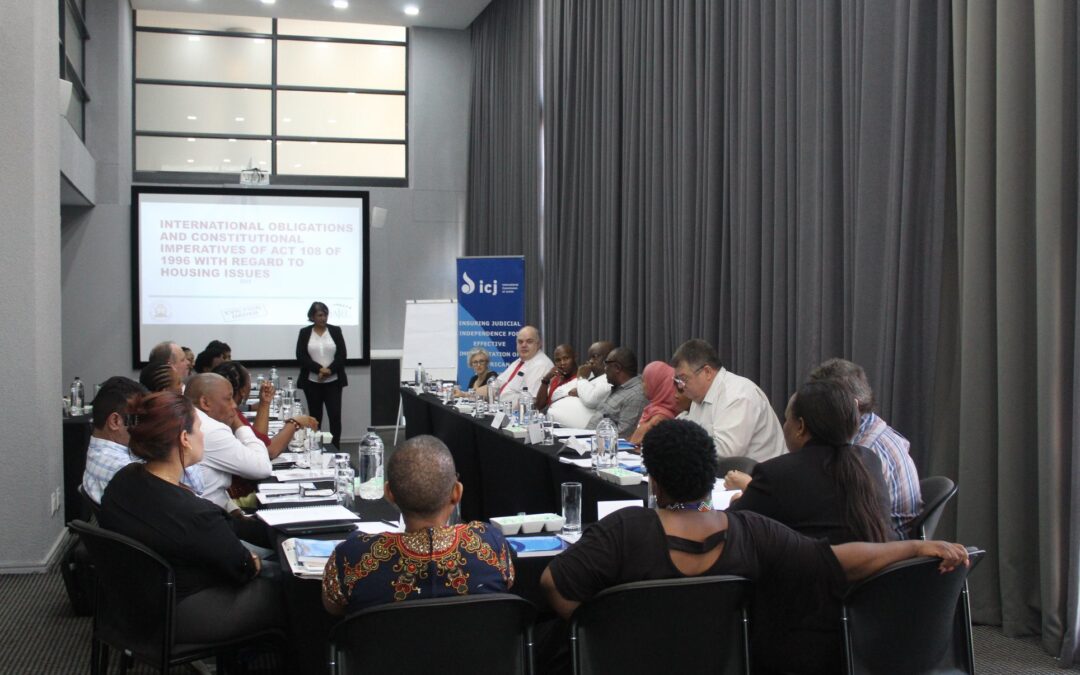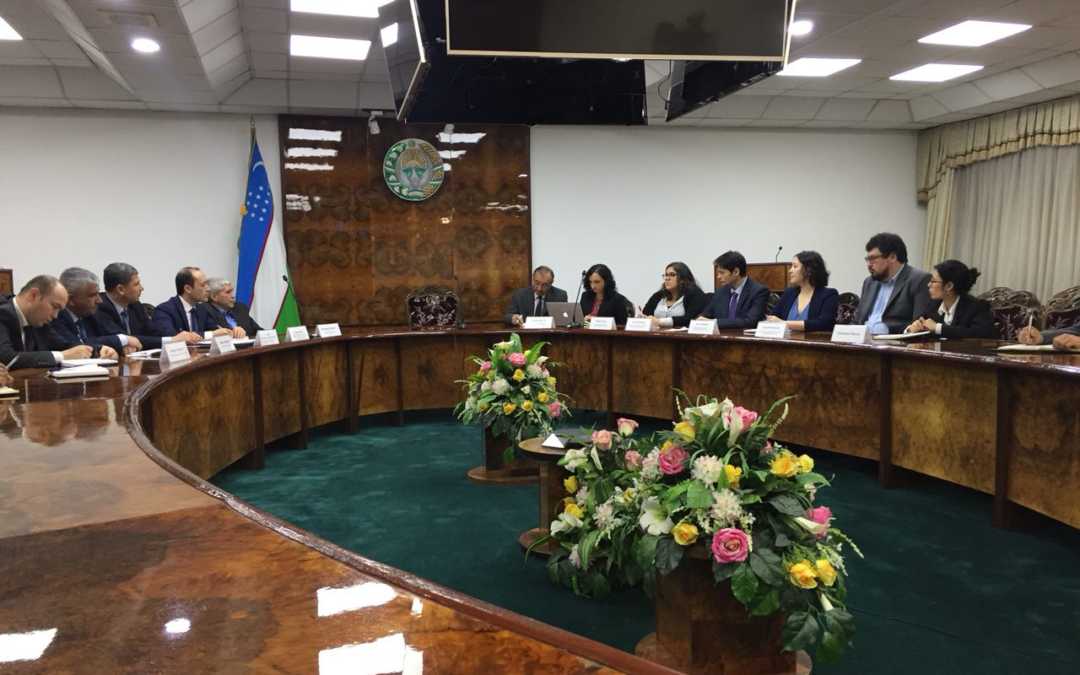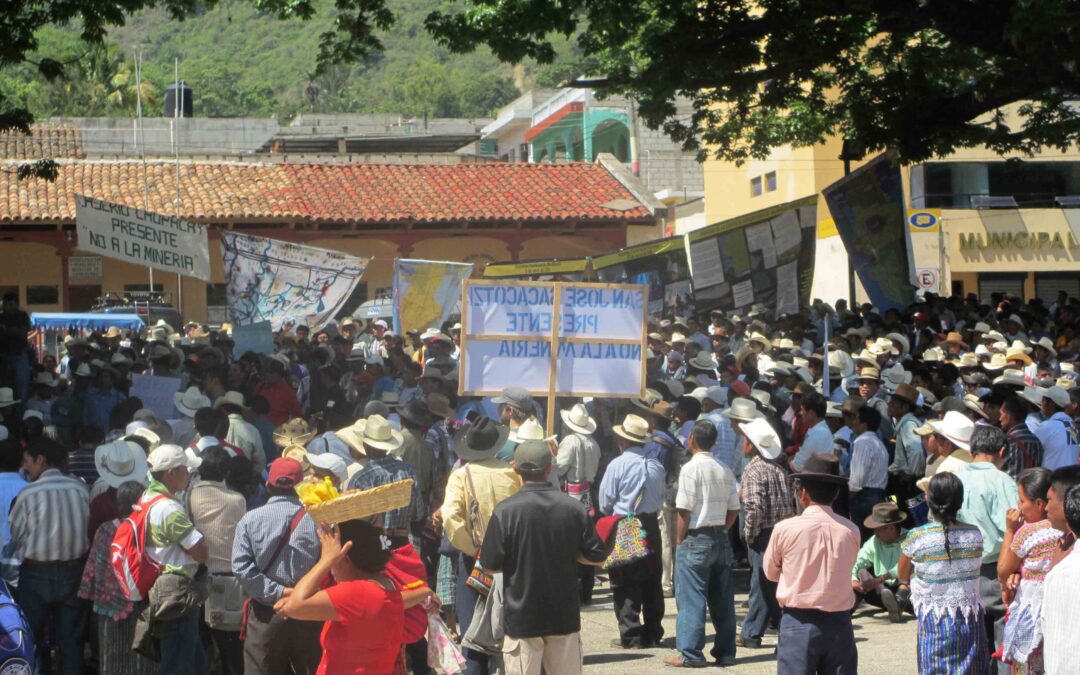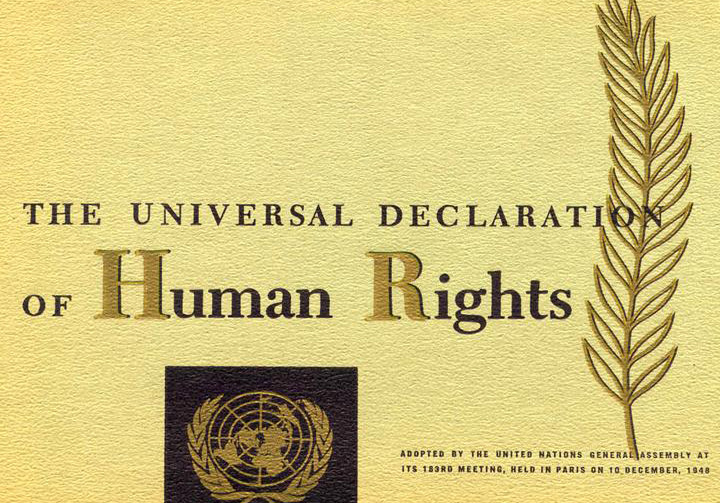
Dec 6, 2019 | Events, News
This year, the ICJ collaborated with the South African Judicial Education Institute (SAJEI) to conduct workshops aimed at strengthening the ability of judicial officers, including Magistrates, to deliver judgments in line with the Constitution and international law. The workshops focused on housing rights and informal traders’ rights.
Topics covered included the social and economic context of South Africa, the role of judicial officers in ensuring the protection of economic, social and cultural rights (ESCR) and the obligation to consider international law standards.
The workshops were conducted using the ICJ Practitioners’ Guide on ESCR and tailor-made training resources that the ICJ designed and produced with SAJEI, while the European Union and the German Institut für Auslandsbeziehungen’s Zivik programme supported the training financially.
Senior magistrate and judicial educator at SAJEI Jinx Bhoola and ICJ Legal Advisor Tim Fish Hodgson facilitated the workshops with the support of ICJ Associate Legal Advisor Khanyo Farisè.
Most of the judicial officers who participated were Magistrates.
“Ensuring effective access at a magistrates’ court level is crucial as Magistrates are the judicial officers concerned with delivering justice in the majority of cases at first instance level. Besides, the majority of people living in South Africa will rarely have the means or assistance to access justice in High Courts,” Hodgson said.
The workshops aimed to introduce the international human rights law and standards framework on social and economic rights to Magistrates.
“The hope is that Magistrates will be able to more effectively perform their functions, while drawing on international law, in cases relating to housing rights and the rights of informal traders if equipped with easily accessible resources to do so,” Hodgson added.
Adding to this, Farisè said: “There is sometimes an assumption that certain groups of individuals are excluded from the rights provided for in the Bill of Rights. It must be emphasized that international human rights law and the right to dignity in the South African Constitution apply to all”.
“When considering these cases, it’s important that judicial officers including Magistrates, have a human rights approach,” Farisè added.
The workshops were well-received. “The Magistrates engaged with energy and enthusiasm with the workshop material, confident that they will be able to ensure the enforcement of socio-economic rights and the securing of access to justice for all in South Africa,” Hodgson said.
Contact:
Khanyo Farisè, Legal Adviser, e: Nokukhanya.Farise(a)icj.org
Tim Fish Hodgson (Legal Adviser), e: Timothy.Hodgson(a)icj.org

Apr 17, 2018 | News
From April 16 to 20, the ICJ is conducting a research mission to Uzbekistan to identify the priority ESC rights issues which will be the focus of its project on access to the economic, social and cultural (ESC) rights (ACCESS project).
During the mission, ICJ experts will meet with key stakeholders, including relevant State bodies, CSOs, legal experts, international organizations in Uzbekistan and other actors to discuss legal and practical aspects of ensuring access to justice for ESC rights.
During the meetings, among others, the following issues will be addressed:
- current legislation ensuring ESC rights in Uzbekistan;
- ongoing and planned reforms in ensuring ESC rights;
- legal protection of ESC rights and barriers to their enjoyment;
- discussion of possible legal, practical aspects related to access to justice in the field of ESC rights.
The ICJ will rely on international standards in the area of ESC rights, in particular, the International Covenant on Economic, Social and Cultural Rights (ICESCR), to which Uzbekistan is a party.
The results of the mission will form a baseline report which will inform the construction and implementation of the ACCESS project.
The ICJ appreciates the facilitation of the Government and of the European Union, which supports the project, in arranging meetings with relevant State institutions.
Contact:
Temur Shakirov, temur.shakirov@icj.org

May 4, 2015 | Advocacy, Non-legal submissions
The ICJ welcomes the opportunity offered by the UN Committee on Economic, Social and Cultural Rights to contribute to its current work on the right to just and favourable conditions of work.
Like other UN treaty bodies, the Committee elaborates general comments to interpret the treaty it is in charge of monitoring and to provide guidance on how to implement the provisions and thus comply with the obligations under this treaty.
Currently, the Committee is consulting relevant actors on its further general comment on article 7 of the international Covenant on Economic, Social and Cultural Rights.
This article guarantees a number of rights to individuals at work, including regarding remuneration and occupational health.
The ICJ is particularly pleased to be given the possibility to share its international and country-based experience on the very topical issues covered by article 7.
In addition to its written submission (read below), the organization will actively participate in the further consultation that will take place during the Committee’s next session in June.
Universal-CESCR Draft General Comment Article 7-Advocacy-Non legal submission-2015-ENG (full text in PDF)

Apr 8, 2014 | News
The ICJ today welcomed steps taken by the Palestinian authorities to accede to core international human rights and humanitarian law conventions.

Dec 10, 2008 | News
The declaration has become a beacon for the development of international law, the institution of universal human rights mechanisms and procedures and a primary instrument for those who struggle for dignity.
Nevertheless, the promise of the Universal Declaration has yet to be fully realised.
“Despite the burgeoning of a culture of human rights in parts of the world, major objectives of the Universal Declaration remain unfulfilled, as the efforts to implement human rights have left many men and women behind”, said Lukas Machon, ICJ Representative to the UN.
UN-Universal declaration of human rights at its 60th anniversary-news-2008 (full text, PDF)









